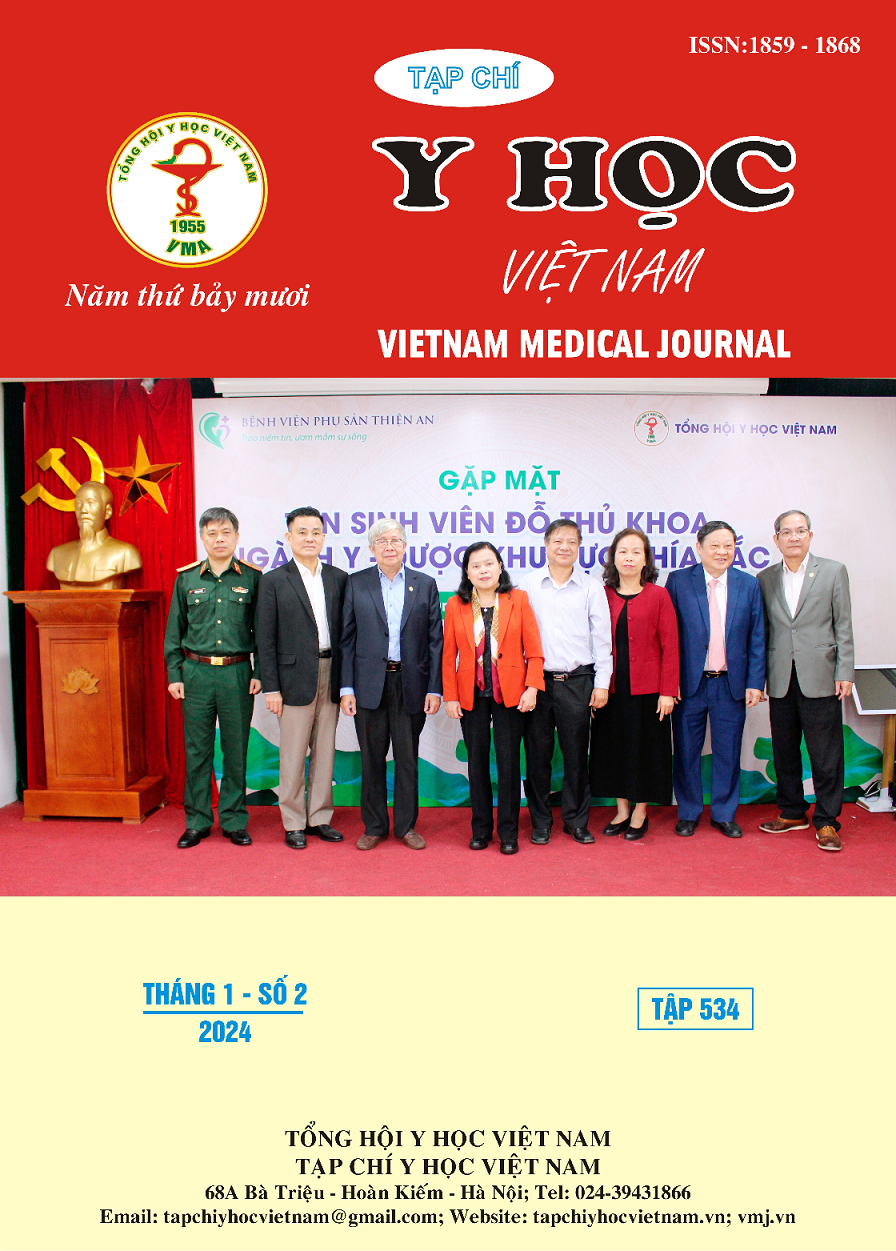MỘT SỐ ĐẶC ĐIỂM LÂM SÀNG Ở BỆNH NHÂN VIÊM NÃO TỰ MIỄN KHÁNG THỂ KHÁNG THỤ THỂ NMDA
Nội dung chính của bài viết
Tóm tắt
Mục tiêu: Mô tả một số đặc điểm lâm sàng ở bệnh nhân viêm não tự miễn do kháng thể kháng N-methyl-D-Apartate. Thiết kế nghiên cứu: mô tả hồi cứu và tiến cứu trên 41 bệnh nhân được chẩn đoán viêm não NMDA và điều trị tại trung tâm hồi sức tích cực Bệnh viện Bạch Mai trong thời gian từ 01/ 2021 –6/2023. Kết quả: Trong 41 bệnh nhân viêm não NMDA đã được nghiên cứu, tuổi trung bình là 29,2 ± 11,48 tuổi; bệnh nhân nữ chiếm ưu thế với 70,7%. Bệnh nhân nhập viện chủ yếu vì rối loạn tâm thần (56%) và các rối loạn thần kinh chiếm 44%. Trong nhóm các triệu chứng về tâm thần, triệu chứng thường gặp nhất là kích động chiếm 49,8% thứ 2 là hoang tưởng chiếm 31,7%, ít gặp nhất là các triệu chứng thờ ơ, tư duy không phù hợp và hành vi kỳ quặc. Trong nhóm thần kinh, triệu chứng hay gặp là co giật chiếm tỷ lệ 34,1%, ít gặp hơn là các triệu chứng rối loạn ý thức (29,3%), loạn động (7,3%), rối loạn ngôn ngữ (17,1%). 41 bệnh nhân được thay huyết tương có 40 bệnh nhân thành công, ghi nhân 1 trường hợp thất bại, trung bình cải thiện triệu chứng sau 6 lần pex. Kết luận: viêm não tự miễn NMDA hay gặp ở nữ trẻ tuổi, với triệu chứng khởi phát nổi trội là các rối loạn tâm thần và hay gặp là triệu chứng kích động, nhóm các rối loạn thần kinh ít gặp hơn và hay gặp các triệu chứng co giật, rối loạn ý thức. Tuy nhiên triệu chứng thần kinh nặng hay gặp khi phải điều trị tại hồi sức tích cực là triệu chứng thần kinh với rối loạn ý thức và co giật khó kiểm soát.
Chi tiết bài viết
Tài liệu tham khảo
2. Dalmau J, Graus F. Antibody-Mediated Encephalitis. N Engl J Med. Mar 1 2018; 378(9):840-851. doi:10.1056/NEJMra1708712
3. Titulaer MJ, McCracken L, Gabilondo I, et al. Treatment and prognostic factors for long-term outcome in patients with anti-NMDA receptor encephalitis: an observational cohort study. The Lancet Neurology. 2013;12(2):157-165. doi:10. 1016/s1474-4422(12)70310-1
4. Sarkis RA, Coffey MJ, Cooper JJ, Hassan I, Lennox B. Anti-N-Methyl-D-Aspartate Receptor Encephalitis: A Review of Psychiatric Phenotypes and Management Considerations: A Report of the American Neuropsychiatric Association Committee on Research. J Neuropsychiatry Clin Neurosci. Spring 2019;31(2): 137-142. doi:10.1176/ appi. neuropsych.18010005
5. Wang Y, Zhang W, Yin J, et al. Anti-N-methyl-d- aspartate receptor encephalitis in children of Central South China: Clinical features, treatment, influencing factors, and outcomes. J Neuroimmunol. Nov 15 2017;312:59-65. doi:10. 1016/j.jneuroim.2017.09.005


